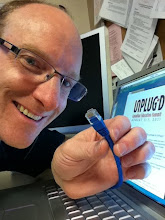 I've always believe that feedback for learners should be kept confidential, and that the information provided to the learner should consist of much more than numbers. In seeming contradiction, the Education Quality and Accountability office (EQAO), has just released board, school, and classroom results for last year's mathematics and language testing.
I've always believe that feedback for learners should be kept confidential, and that the information provided to the learner should consist of much more than numbers. In seeming contradiction, the Education Quality and Accountability office (EQAO), has just released board, school, and classroom results for last year's mathematics and language testing.Newspapers are keen to publish the results of community schools with comparisons to the provincial mean, but nothing other than the numbers seems to result from these assessments. While the scores may do plenty to indicate disparities among a region's learning communities, I'd feel better about the assessments if constructive recommendations were provided with the numbers.
Absent recommendations in the news, here is my advice:
The best way to ameliorate the problems is not to pour money into schools, but to pour resources out of schools.
We know that the strongest indicators of success on standardized tests, are family income, and the availability of learning resources (books, CDs, DVDs...) within the home. Why have so few come to the realization that schools can become learning centres for entire communities.
If we believe that the school resource centre is there to ensure learning materials find their way into homes throughout the district, then maybe it's time we open the doors to the entire community rather than limiting lending to the student body. Parents and caregivers would be able to drop into any school in order to borrow educational games, books or other learning materials. Families without access to computers, might be able to teach themselves about the world wide web. With a simple school library card, these users might regularly refresh the learning materials in their homes.
 To take it a step further: What if these school libraries were wired into the public library system? Community members might then order materials from a broader, richer selection, that could be shared from school to public library and back again.
To take it a step further: What if these school libraries were wired into the public library system? Community members might then order materials from a broader, richer selection, that could be shared from school to public library and back again.I'm not so sure that the annual test scores are worthy of front page news, and I'm even less sure that school boards should be so reactionary as to pour staff and resources into schools that score below par. Instead, let's use the information to develop a targeted strategy that enriches the home learning environment. More than our students would benefit!
Podcast Version: Teacher 2.0 Episode #116
Photo Credits: Kristin Pishdadi; Dory Kornfeld




3 comments:
I absolutely believe in the comments you made in your post. I have been a teacher-librarian for many years working in a wonderful facility with many resources that remain out of bounds to anyone but a teacher at the school after the 4:30 closure.
When we did try to open the doors to the community we met so many barriers that eventually we had to accept that it could not work. No funds for hiring staff, an unwillingness to build access to only the library and restrict access to the rest of a very large school, as well as restrictive policies for circulating resources and using computers ultimately led to failure of the initiative.
The school systems serve those students best who need them the least. And they serve teachers/admins better than either of those. I suggest that you take it a step further. Advocate for dismantling of the current educational structure, and provide education to children/adults within the public library system.
Donna,
There are significant staffing needs if we open schools and computer labs during evenings, and though that would make more wise use of resources paid for by the province, I think a first step might be simply to allow more broad borrowing during regular school hours.
Greg,
Though we might design a different system if we were to begin from nothing, the reality is that schools are very much tied to the past. As such, any changes are incremental, with changes in education rarely keeping up with the pace of change in the rest of the world. Rather than dismantle everything, I think we need to encourage more experimentation in setting up unique learning communities.
Post a Comment